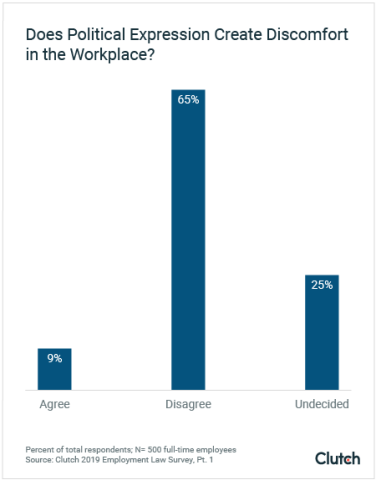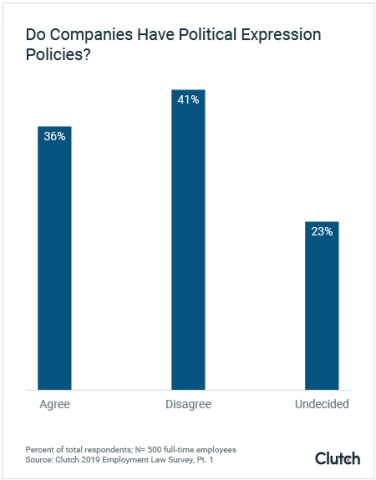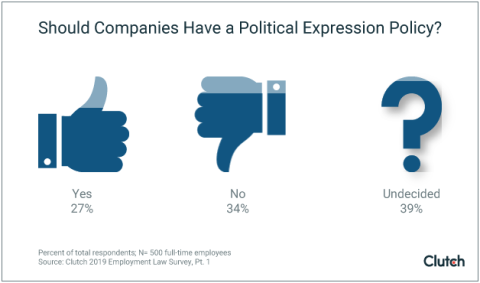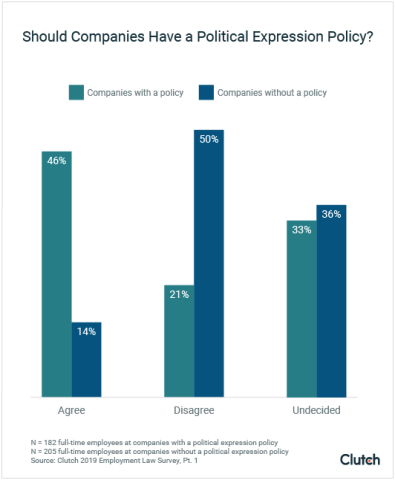![How to Choose an IP Law Firm [With Checklist]](https://img.shgstatic.com/clutch-static-prod/image/resize/715x400/s3fs-public/article/1396ae6bad8e8579446e9c1863db83bb.png)
![How to Choose an IP Law Firm [With Checklist]](https://img.shgstatic.com/clutch-static-prod/image/resize/715x400/s3fs-public/article/1396ae6bad8e8579446e9c1863db83bb.png)
Updated June 26, 2025
Political expression policies outline acceptable political discussion and create a more comfortable work environment for employees. Most employees, though, haven’t experienced discomfort or discrimination at work because of their political views, according to our findings. Still, political expression policies can help avoid a hostile workplace and provide legal protection for companies by ensuring that they comply with labor and employment laws.
Political expression in the workplace, like conversations, campaign materials, or provocative clothing, can foster uncomfortable dynamics and even hostility among colleagues.
When an office environment is unsuitable for employees to work in due to political discrimination, it can be considered a hostile workplace.
Looking for a Legal agency?
Compare our list of top Legal companies near you
To avoid a hostile work environment, companies can implement a political expression policy that outlines the political expressions and discussions that are acceptable at work.
Clutch surveyed 500 full-time employees to understand their experiences with and attitudes about political expression in the workplace and to determine how political expression contributes to a hostile workplace.
We found that most employees have not recently felt uncomfortable or discriminated against because of their political views in the workplace, signaling that political expression may not contribute strongly to a hostile workplace.
Still, companies should create political expression guidelines that employees can follow. Companies that create a political expression policy can outline office standards that avoid a hostile workplace and protect them from legal action.
Political expression is not a cause of immediate discomfort for employees. Still, political discussion can create a tense work environment, particularly when it occurs consistently.
Only 9% of employees agree that they’ve felt uncomfortable in the past week as a result of political expression in the workplace.

Nearly two-thirds of employees (65%) disagree that they’ve felt uncomfortable in the past week as a result of political expression.
When political discussion occurs at work, it can have an emotional toll on employees and decrease productivity. This is particularly prevalent during election cycles when people’s focus on politics becomes intense and constant.
“Elections often cause much rancorous debate, which can bring out the ugly side of a person’s personality,” said Samuel Johns, a career advisor for Resume Genius, a resume building software. “This unpleasantness can lead to conflicts and less collaboration between teammates.”
Unwelcome or uncomfortable political discussion can harm an office environment, particularly if it becomes a consistent issue.
A political expression policy creates a legal safety net for companies by ensuring that they comply with employment and labor laws.
Employees enjoy certain protections in the workplace. These protections fall under 2 different sets of laws that outline acceptable political discussion and hiring practices:
The NLRA, for example, allows employees to engage in “concerted communication” about political issues that relate to their employment, such as pay scale or workplace safety.
Employees also are guaranteed that they are not discriminated against due to their age, gender, religion, race, or ethnicity under employment laws such as the Equal Employment Opportunity Commission (EEOC).
A political expression policy should outline how your company complies with these laws.
“You want a political expression policy in place to uphold your company's anti-discrimination and equal opportunity policies,” said Ellen Mullarkey, vice president of Messina Staffing, a staffing firm in Chicago.
A political expression policy also can outline the protections that employees do not enjoy in the workplace.
For example, "freedom of expression," as outlined in the U.S. Constitution, does not apply to employees at private companies in most circumstances.
"Generally, private employers are not subject to the First Amendment and can discipline an employee for offensive political statements or inappropriate conduct at work," said John Snyder, principal at Jackson Lewis P.C., a law firm in New York. "Of course there are caveats as to what is protected under various laws and scenarios."
Without this knowledge, employees may think they can bring up any topic they like at work. Political expression policies set expectations for employee conduct that can avoid future legal issues for companies.
"[Political] debates — in the worst case — could lead to lawsuits, so preventing them before they transpire is simply good business," Johns said.
Companies should consider hiring an employment law firm to ensure that their political expression policies uphold their legal obligations as an employer and help employees understand what political expression is allowed in the workplace.
Political expression policies set the framework for how to respond to political discrimination in the workplace, though very few employees report that they have experienced discrimination because of their politics.
Only 8% of employees agree that they’ve felt singled out or discriminated against because of their political views at work in the past year.

Even if few employees have experienced political discrimination, those rare cases can cause serious issues for a company.
"All it takes is a few claims to make your life miserable as an employer," said Jerry Oppel, senior counsel in the Baltimore office of Baker Donelson, a national law firm.
To respond to cases that do arise if an employee reports discomfort or discrimination because of political expression, companies should have a policy to reference.
“When employees are overly focused on politics, a political expression policy provides the framework for training, as well as for disciplinary action should things get out of hand,” Mullarkey said.
Political expression policies should outline how to avoid political discrimination and how to address it if necessary.
Political expression policies help employees feel comfortable about the topics they can discuss in the workplace, which can foster a respectful office culture. Few companies, though, have a defined policy, according to employees.
Forty-one percent (41%) of employees disagree that their company has a political expression policy compared to 36% of employees who agree that their company has a policy.

Over one-fifth of employees (23%) do not know if their company has a political expression policy.
Often, employees may not realize when political discussion or expression is offensive to colleagues. A political expression policy can clearly define certain boundaries and sensitive topics for employees, which helps strengthen your company's defense if legal action occurs.
Oppel suggests that companies rely on legal services to help formulate a policy that covers all of its legal vulnerabilities with political expression.
"If you’re definite [in your policy] and you have some roles or positions set out, you stand a better chance of prevailing in any kind of litigation or maybe even preventing it," Oppel said. "This is something the company and employment counsel should discuss."
For example, if an employee uses a company-wide message board or email listserv to invite people to participate in a campaign supporting a particular political party, candidate, or issue, people who do not agree with or support that cause may feel singled out.
“People don’t understand that they are saying something wrong by expressing a political belief, but a [political expression] policy would make them more aware of certain political sensitivities through conversations and discussions,” said Miles Maftean, a content specialist for Zety, an online resume builder.
A political expression policy informs employees about the issues they can freely discuss at work and creates expectations for a workplace that respects employees and complies with the law.
"A [political expression] policy would make employees more aware of certain political sensitivities through conversations and discussions.”
By providing these guidelines, a political expression policy supports both a company’s legal and HR functions.
“Political expression policies must be well-drafted for legal and HR purposes with consideration of the culture of the organization,” Snyder said.
Companies that create a political expression policy can educate their employees about how to discuss politics in a civil manner. This can help your company's legal and HR services by reducing tension in the office and avoid a hostile workplace.
If employees experience discomfort or discrimination at work because of politics, they hesitate to tell management, which can create legal problems for companies.
Only 3% of employees agree that they’ve considered talking to a manager about political conversations in the workplace over the past year.

This finding indicates that employees may not trust management with political expression issues. It also signals that if employees ever need to address an issue related to political expression in the workplace, they may seek legal action instead of speaking with management.
Companies should encourage employees to approach management if they feel uncomfortable about political discussion to avoid legal scrutiny.
Political expression policies don’t have widespread support from employees, which makes it challenging for companies to convince employees to buy into the need for a formal policy.
More than one-third of employees (34%) disagree that their company should have a political expression policy compared to 27% who agree that their company should have one.

Thirty-nine percent (39%) neither agree nor disagree that their company should have a political expression policy.
This creates an unenviable position for companies: Employees are unlikely to support a policy, but companies need a policy to protect them from legal liability if a hostile workplace or legal action arises from political discord in the office.
The lack of employee support for political expression policies may cause a company to hesitate or decide not to create a policy, which leaves the company vulnerable to legal action.
Political expression policies can raise employees’ awareness about acceptable ways to discuss politics at work and the proper avenues to address inappropriate political expression.
Nearly half of employees at companies with a political expression policy (46%) agree that their company should have a policy, more than three times the number of employees at companies without a policy (14%).

People are more clear about the political discussions that can cause an uncomfortable work environment when their company has a political expression policy.
“A benefit of having a policy is clarity and transparency for employees,” said Ximena Hartsock, president of Phone2Action, a digital advocacy platform in Arlington, Va that connects citizens to lawmakers.
Moreover, when companies couple political sensitivity training with a detailed policy about workplace political discussion, they raise employee awareness about the topics that can potentially create a hostile workplace.
“Once a company gives employees political sensitivity training, employees should be more aware and sensitive about sparking political conversations at work,” Mullarkey said.
Companies can provide clarity and training about acceptable political expression through a defined policy. This helps foster a more understanding and aware workforce that recognizes the appropriate topics to discuss and channels to use to express political views.
In the modern workplace, companies have to balance how to respect employee privacy with how to regulate political expression on social media, though some employees support policing personal social media at work.
Twenty-nine percent (29%) of employees agree that their company should clarify how employees can use social media to express political views at work.
When people post or discuss politics on social media at work, they blur the line between personal and workplace political expression.
Posting or sharing political content on social media may not be considered political expression in the workplace because social media is not actually in the workplace.
“People are likely to consider social media posts a part of their colleague’s personal lives and don’t feel comfortable complaining about them to HR,” Johns said.
Some employees hesitate to address discomfort or discrimination that they experience on social media through traditional company channels such as an HR representative.
“People are likely to consider social media posts a part of their colleague’s personal lives and don’t feel comfortable complaining about them to HR.”
Since employees may view social media as an extension of their private lives, they may not be as cautious about sharing their political views online as they are in an office.
“People feel comfortable expressing how they feel online, so social media raises the discomfort factor significantly, especially when employees post negative content that personally impacts their coworkers,” Mullarkey said.
Employees, though, may feel the same discomfort due to colleagues’ actions on social media as they would if a political discussion took place in an office.
Companies should consider that some employees are wary of the discomfort that can result from people expressing political views on social media and make clear the standards for political expression on social media while at work.
Political expression in the workplace may cause employees to feel discomfort or discrimination because of their political views, which can contribute to a hostile workplace.
A political expression policy can help companies avoid a hostile workplace by providing guidelines about the political expression that is acceptable in the office. A policy also ensures that companies comply with employment and labor laws.
Political expression policies are fairly uncommon among companies, though, and employees aren’t convinced that their companies should have a political expression policy.
Employees who work at a company with a political expression policy, however, tend to value political expression policies.
It’s important for companies to establish a political expression policy to foster a safe environment for employees and avoid a hostile workplace. This is particularly true since employees are unlikely to consider alerting management if they experience political discomfort in the workplace.
Clutch surveyed 500 full-time employees in the U.S. to learn about their experiences with and opinions about political expression in the workplace.
Respondents are employed at companies of all sizes: Forty-one percent (41%) work at companies with 50 employees or fewer; 15% at companies with 51-200 employees; 16% at companies with 201-1000 employees; and 28% at companies with more than 1,000 employees.
![How to Choose an IP Law Firm [With Checklist]](https://img.shgstatic.com/clutch-static-prod/image/resize/715x400/s3fs-public/article/1396ae6bad8e8579446e9c1863db83bb.png)

